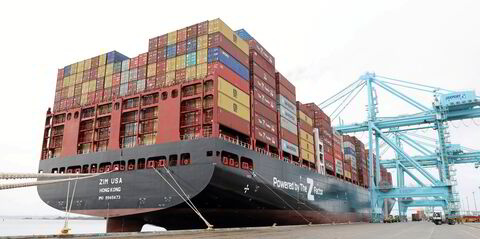Three years ago, shipping was on the verge of a major change.
The International Maritime Organization was gearing up to place a strict cap on the content of sulphur oxides in shipping fuel, ratcheting it down to just 0.5%, from a previous limit of 3.5%.
Now, shipping is facing another air pollution challenge, reducing its greenhouse gas emissions.

Yet the fuel that has become the primary alternative to high-sulphur heavy fuel oil has more carbon per tonne, and that raises the question of the latest edition of the Green Seas podcast: Did the IMO 2020 regulation, while cutting sulphur emissions, lead to an increase in carbon pollution?
A look back
In the run-up to IMO 2020, the new regulation threatened to shake up marine fuel markets. Shipowners could no longer just run their ships on heavy fuel oil. Cheap but still densely packed with energy, it had been the industry’s favourite fuel for decades, and refiners loved selling it because it was basically a byproduct of producing distillate fuels like gasoline.
Shipping was worried.
To comply with IMO 2020, shipowners had a few options. They could purchase a compliant fuel. The option already in the market was a distillate known as marine gasoil, but refiners also worked on new grades of heavy fuel oil known as very low sulphur fuel oil (VLSFO). Or they could install exhaust gas scrubbers, which allow ships to continue burning high-sulphur fuel oil. (Some shipowners built or converted ships to run on LNG).
In April 2019, Italian shipowner Paolo d’Amico, who was chairman of tanker group Intertanko, told TradeWinds that the group was eager to receive guidelines from the IMO about how to operate in the upcoming new environment.
“Because we are, number one, not sure that we are going to find compliant fuel everywhere,” he said in a video interview, adding that a standard fuel specification was not expected until 2022.
“We are extremely worried how fuels will be compatible one way or the other one way or another having engine breakdowns or major incidents out of that.”
But d’Amico ended up being partially prophetic.
“It will work because we will make it work,” he said. “At the end of the day, everybody will be jumping on marine gas oil in order to resolve any sort of problems.”
Overall, when January 2020 rolled around, it did work, with some hiccups. But while marine gas oil usage did increase, the new VLSFO became dominant.
Bryan Comer, marine programme lead at the non-profit research group International Council on Clean Transportation (ICCT), said that on the IMO 2020 roll-out, shipping worried about “overnight regulation”.
“‘We’re gonna go to sleep one day, we’re going to wake up the next day, and it’s going to be a whole new world, and we just don’t know what the consequences are going to be,’” he said, recalling the sentiment.
“And what ended up happening was probably the smoothest roll-out of any environmental regulation for the shipping sector that we’ve ever had.”

IMO 2020 was never about carbon or climate change. It was about reducing emissions of sulphur oxides, also known as SOx, because of their impact on human health.
But here we are in 2022 and the IMO is focused on greenhouse gas emissions. CO2 emissions dropped in 2020 as the Covid-19 pandemic slammed the global economy. Then as shipping demand rose and fuelled congestion, shipping’s emissions bounced back in 2021.
Last week on the Green Seas podcast we looked at scrubbers, whose use continues to increase as a way to keep burning high-sulphur fuel oil after IMO 2020, which is cheaper than its alternatives.
While working on that episode Donald Gregory, head of the scrubber industry Exhaust Gas Cleaning Systems Association, told me in an email that the use of low-sulphur fuel oils to meet IMO 2020 has resulted in higher CO2 emissions.

“This is fact and not sensationalist claims as made by the environmental NGOs,” he said.
He pointed to a study by consultancy CE Delft that he said showed 5% lower CO2 footprint from the use of high-sulphur fuel oil with scrubbers, compared to VLFSO.
An August 2020 CE Delft report found that removing sulphur from fuel, either in a refinery or by using a scrubber, leads to higher carbon emissions.
But whether a scrubber results in lower added emissions depends on fuel quality. The study found that VLSFO is combined with fuel quality improvements, it does lead to higher CO2 than scrubbers.
Shipping industry stakeholders often point to the lower carbon content of high-sulphur heavy fuel oil compared to the very low-sulphur alternative or even marine gasoil.
But the ICCT’s Comer said VLSFO actually has resulted in a less than 1% reduction in emissions of CO2 in shipping because of energy content, the amount of energy in each gram of a fuel.
“Because even though the amount of carbon per gram of fuel went up slightly, the energy content of the fuel went up as well. And so you don’t need to burn as much of it to get the same amount of propulsion power,” he said.
Many environmental groups were hoping that IMO 2020 would lead to an end to heavy fuel oil and a switch to distillates. Comer said that could have improved emissions onboard a ship because of marine gasoil’s higher energy content, but over the life cycle of the fuels, it is a wash because distillates take more energy to produce.
And scrubbers?
“The one thing that we did find is that when you put a scrubber on a ship, you’re consuming about 2% more fuel than you would have otherwise, before you had the scrubber,” he said, citing the energy used to power the exhaust cleaning systems. “So that’s actually making carbon emissions worse.”
So, he said, technically it’s incorrect to say carbon emissions increased as a result of IMO 2020.

However, that does not mean there was no climate impact from IMO 2020. Sulphur emissions have what is effectively a cooling effect, and that climate benefit is not there if sulphur content is reduced.
With the focus on climate issues today, Comer said that what often gets overlooked is what IMO 2020 achieved.
He said studies have shown that it has resulted in a decrease in sulphur oxides in the atmosphere, and that has a human health benefit.
“It made things better for a lot of people,” he said. “It reduced childhood asthma. It reduced premature mortality from lung disease and heart disease and improved air quality at poor communities,” he said. “And so I think it had a real material benefit to society.”
But the fact that 2020 started without major disruption in the industry is encouraging for those who are now focused on advocating for greenhouse gas regulation.
It gave a lot of us who work really hard to get environmental policies in place for the international shipping sector a lot of confidence that we can actually do it,” he said. “We can impose change on the industry, and it can go smoothly as long as there’s some lead time and everybody’s prepared.”
And he said, even though the IMO does not regulate the fuel industry, a topic that is relevant in today’s debate over greenhouse gas emissions, if new rules create demand for new fuels, the sulphur cap shows that the supply will be there.



